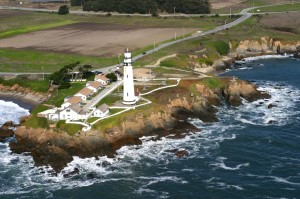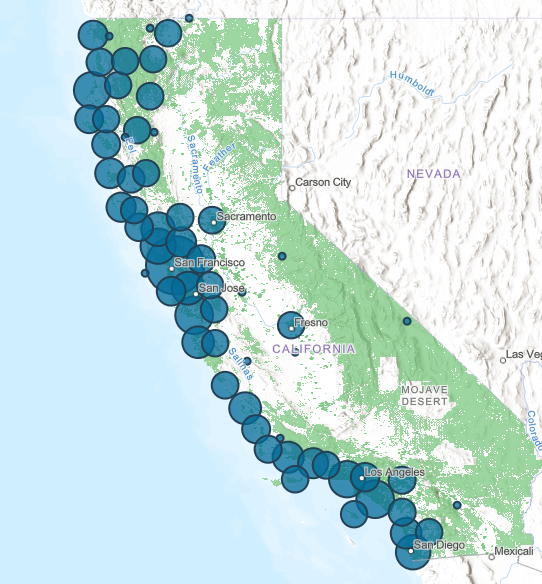Climate Ready Grant Round
The Conservancy announces a new Climate Ready grant solicitation; applications are due July 1, 2019. Climate Ready grants fund nature-based solutions for climate adaptation. This round will fund planning and implementation of managed retreat, natural shoreline infrastructure, living shorelines and habitat enhancement projects. This round is funded by the Greenhouse Gas Reduction Fund, and projects must facilitate greenhouse gas emission reductions. The solicitation document and application materials are posted here.
SF Bay Area Prop 68 Draft Climate Adaptation Grant Guidelines
Prop 68 provides funding to assist coastal communities with adaptation to climate change, including $14 million allocated to the San Francisco Bay Area Conservancy Program of the Coastal Conservancy (“Prop 68 SF Bay Climate Funds”). This chapter of Prop 68 requires that the Coastal Conservancy (“Conservancy”) develop competitive grant guidelines. The draft guidelines are posted here. Comments on the draft guidelines should be emailed to: grants@scc.ca.gov by July 19, 2019. The Conservancy will also hold three public meetings to receive comments on these guidelines.
Workshop Dates:
o Workshop #1
May 16th, 2019 from 1:30p-3:30p
State Capitol, Room 126
1315 10th St. Sacramento, CA 95814
o Workshop #2
June 6th, 2019 from 1:00p-3:00p
Redwood City Public Library, Community Room
1044 Middlefield Road, Redwood City, CA 94063
o Workshop #3
June 27th, 2019 from 1:00p-3:00p
1515 Clay Street, 2nd Floor, Room #11
Oakland, CA 94612
Proposition 1 Grant Round – Bay Area Urban Greening Projects
The Conservancy announces a new Proposition 1 Grant Solicitation focused on multi-benefit urban greening projects in the nine counties of the San Francisco Bay Area. Through this grant round the Conservancy seeks to support urban greening projects that meaningfully enhance the ecological function of bay area creeks, watershed and wetlands. These are projects that provide at least two of the following benefits: increase groundwater recharge, enhance the natural flow of waterways, improve water quality, improve urban watershed health, create or enhance public green space, or expand urban forests. The Conservancy seeks to support urban greening projects which are layered with other community public benefits consistent with the Conservancy’s mandate and authorities.
The grant application is posted here.
Strategic Plan Update
The Coastal Conservancy has updated its Strategic Plan to include priorities for Proposition 1 (Water Bond) expenditure, to update our Climate Change objectives and to address the newly created Santa Ana River Conservancy Program. The Strategic Plan update is available here.
CLIMATE READY PROGRAM
The Coastal Conservancy’s Climate Ready program provides a focus for our work protecting important coastal resources and habitats from the current and future impacts of climate change. The Conservancy is collaborating with local partners and other agencies to reduce greenhouse gas emissions and prepare communities along the coast and within the San Francisco Bay for climate change. SB 1066 (Lieu) effective January 1, 2013 gave the Coastal Conservancy explicit authority to work with its partners on projects to address the effects of climate change on coastal resources along the coast and within the San Francisco Bay Area, including those that:
- prepare our communities for extreme weather events, sea level rise, storm surge, beach and bluff erosion, salt water intrusion, and flooding;
- address threats to coastal communities, natural resources and infrastructure; and
- reduce greenhouse gas emissions.
Climate Ready Programmatic Priorities
Projects selected for funding under the Climate Ready program will be those that best incorporate the following Climate Ready Programmatic Priorities (adapted in part from climate-smart principles developed by the National Wildlife Federation Climate Change Adaptation Principles, 2011, Resource Legacy Fund, 2012 and Climate Smart Practices by Point Blue, 2013):
- Safeguard people and wildlife by using nature-based solutions that provide co-benefits for people, wildlife, and the economy.
- Prioritize projects that maximize public benefits and avoid maladaptation.
- Promote collaboration among various stakeholders and multiple sectors. Establish and expand non-traditional alliances to accelerate effective problem-solving between and among public and private resource managers, scientists, and decision-makers.
- Incorporate the best available science by utilizing peer-reviewed and well-documented climate science, climate adaptation strategies, and management practices.
- Focus on future climatic and ecological conditions rather than the past.
- Design actions from a landscape, ecosystem, and watershed perspective on a regional scale.
- Account for a high degree of uncertainty by developing and implementing strategies that provide the greatest benefits across a range of possible future climate scenarios.
- Minimize energy use and greenhouse gas emissions. Enhance the ability of natural systems to sequester greenhouse gases.
- Address the needs of low-income and other underserved populations that will be highly impacted by climate change.
- Promote on-the-ground demonstration projects that implement innovative approaches or enhance understanding of effective management strategies and will potentially lead to broader change to policies, regulations, or to duplicating the effort elsewhere;
- Incorporates a project-appropriate outreach or educational component.




